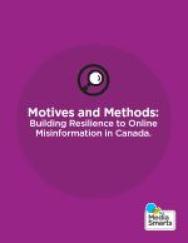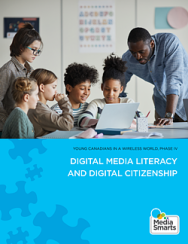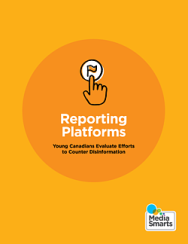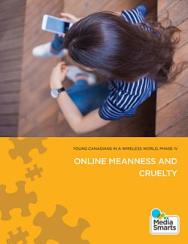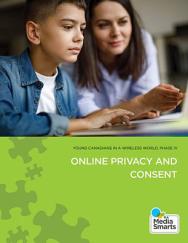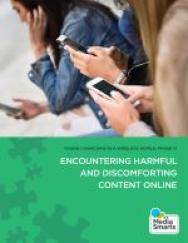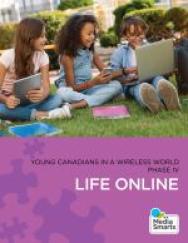Motives and Methods: Building Resilience to Online Misinformation in Canada
MediaSmarts designed the Motives and Methods research project to better understand how Canadians check and share information online. This study, which included a survey of 5,000 Canadians and interactive focus groups, builds on MediaSmarts' successful Break the Fake (BTF) program. It looks at changes in participants’ fact-checking after watching a BTF video, along with their sharing habits, frequency of fact-checking, and confidence in their skills. Based on our study findings, we provide recommendations for designing effective video interventions that build citizen resilience to misinformation in Canada. This research shows that digital media literacy education works and encourages a wide range of people to check the accuracy of online content, especially before sharing it.
Young Canadians in a Wireless World, Phase IV: Trends and Recommendations
Young Canadians in a Wireless World (YCWW) is Canada’s longest running and most comprehensive research study on young people’s attitudes, behaviours and opinions regarding the internet, technology and digital media. This report brings together findings from the qualitative and quantitative portions of Phase IV and offers a series of recommendations based on this data. We end this report with some reflections and conclusions on Phase IV of YCWW, including lessons learned and offer some next steps regarding the development of Phase V and the state of digital media literacy in Canada.
Moving On: Digital Empowerment and Literacy Skills for Survivors Needs Assessment Report
In this report, we detail the methodology and results of a needs assessment we conducted in February and March 2023 to understand the current needs and concerns of survivors and practitioners regarding addressing and preventing technology-facilitated violence and abuse in Canada.
Young Canadians in a Wireless World, Phase IV: Digital Media Literacy and Digital Citizenship
Young Canadians in a Wireless World (YCWW) is Canada’s longest running and most comprehensive research study on young people’s attitudes, behaviours and opinions regarding the internet, technology and digital media. In this report we present findings related to digital media literacy and digital citizenship, including findings related to verifying online information , learning digital media literacy skills and ethical digital citizenship. Data collected in Phase IV of YCWW helps us better understand how young Canadians determine the reliability of the sources they come across online and whether they understand the benefit of some verification practices over others. This report also includes a brief case study on whether youth understand the business model and general operation of search engines like Google. We speak to the digital media literacy skills young Canadians are learning, from whom, and what skills they are interested in learning more about. Knowing more about how youth navigate and participate in online spaces gives us some insight into their ability to actively and positively participate in online communities as digital citizens. This report also solidifies the need for a national strategy to prioritize digital media literacy education in classrooms and communities across Canada.
Reporting Platforms: Young Canadians Evaluate Efforts to Counter Disinformation
MediaSmarts facilitated online focus groups with youth ages 16 to 29 to examine and assess reporting processes on popular apps (Instagram, TikTok, Twitter, and YouTube). More specifically, we wanted to understand how young Canadians feel about current efforts to counter misinformation and disinformation online and what solutions they have regarding the problems and concerns they experience while navigating online information ecosystems and communities. Overall, youth expressed a lack of trust and confidence in the ability of platforms to counter misinformation and disinformation and to keep them informed and safe online. Participants emphasized that users are not provided with meaningful opportunities to engage with platforms to prevent and address misinformation and disinformation, and they felt platforms must make design changes that prioritize values of accuracy, transparency, trust, responsibility, and safety.
Young Canadians in a Wireless World, Phase IV: Relationships and technology: Sexting
Young Canadians in a Wireless World (YCWW) is Canada’s longest running and most comprehensive research study on young people’s attitudes, behaviours and opinions regarding the internet, technology and digital media. This report is the second of two reports focusing on relationships and technology. In it, we share findings related to sending, receiving, and forwarding sexts and highlight what the YCWW Phase IV survey data tells us about young Canadians’ motivations and attitudes for engaging in sexting. We also speak to the role of trust and support in sexting behaviours among youth, focusing specifically on the impact of adult involvement and supervision and the desire for further educational support on this topic. Finally, we share resources that are currently available on the MediaSmarts website regarding sexting and highlight current research in the field that expands upon what we offer in this report.
Within the Phase IV YCWW survey, questions related to sexting were only available to participants in grades 7 to 11 (n=659). Overall, the sample size for youth who indicated they engaged in sexting was very small; in most cases, n=110 or less.
Young Canadians in a Wireless World, Phase IV: Online Meanness and Cruelty
Young Canadians in a Wireless World (YCWW) is Canada’s longest running and most comprehensive research study on young people’s attitudes, behaviours and opinions regarding the internet, technology and digital media. This report is the first of two reports focusing on relationships and technology. This report highlights how often and where youth experience, witness, and engage in online cruelty as well as the reasons or motivations for their engagement. In the report, we also summarize findings related to how young people respond to online meanness and cruelty and from whom they seek support in navigating these harmful experiences.
Young Canadians in a Wireless World, Phase IV: Online Privacy and Consent
Young Canadians in a Wireless World (YCWW) is Canada’s longest running and most comprehensive research study on young people’s attitudes, behaviours and opinions regarding the internet, technology and digital media. This report highlights findings related to how youth share and protect their personal information online and how they manage their identities in online spaces; how youth do or do not engage in various privacy practices like reading terms of service or using privacy settings; how youth feel about various forms of interpersonal and corporate surveillance online; and how various rules and practices in the home and between adults and youth can impact online privacy.
Young Canadians in a Wireless World, Phase IV: Encountering Harmful and Discomforting Content Online
Young Canadians in a Wireless World (YCWW) is Canada’s longest-running and most comprehensive research study on young people’s attitudes, behaviours and opinions regarding the internet, technology and digital media. This report highlights findings related to how often youth come across harmful and discomforting content, including racist and sexist content and pornography, in which online spaces they most often see it, and how they tend to respond to it.
Young Canadians in a Wireless World, Phase IV: Life Online
Young Canadians in a Wireless World (YCWW) is Canada’s longest-running and most comprehensive research study on young people’s attitudes, behaviours and opinions regarding the internet, technology and digital media. The study is currently in its fourth phase, and Life Online is the first in a series of reports that summarize the findings from the survey. This first report – Life Online – provides a glimpse into the online lives of young Canadians and highlights findings related to device use, online activities, screen time, technology in the classroom, household rules, and how young people feel about unplugging and going offline occasionally.

